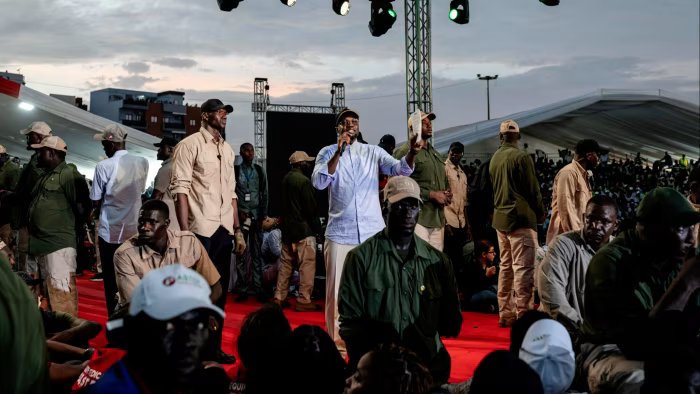Unlock the Editor’s Digest for free
Roula Khalaf, Editor of the FT, selects her favourite stories in this weekly newsletter.
Senegal’s international bonds have plunged in price after the West African nation’s government ruled out a restructuring of its debts in the wake of a multibillion-dollar hidden loan scandal.
The country’s euro-denominated bonds due in 2028 fell four cents on Monday to 78 cents on the euro, giving a yield of more than 16 per cent, after Senegal’s prime minister said at the weekend that any proposal to restructure the country’s debts would be “a disgrace”. Bond yields rise when prices fall.
Senegal’s dollar bonds due in 2031 also fell more than four cents on Monday to 72 cents on the dollar. The country has more than $25bn of external debts, of which $4.7bn is in eurobonds.
The IMF suspended its support to Senegal following the revelation more than a year ago of at least $7bn in hidden borrowing under the previous government of President Macky Sall, which pushed the country’s debt to the equivalent of more than 130 per cent of GDP.
Senegal has become a test of the IMF’s ability to tackle cases of hidden debt on its watch since Mozambique’s notorious ‘tuna bond’ scandal of the 2010s, and of how far the fund is prepared to go in demanding debt relief from other creditors to safeguard its bailouts.

The debt crisis has hit one of Africa’s fastest growing economies and one of the continent’s most stable democracies. The start of oil and gas production last year is likely to boost Senegal’s economic growth to nearly 8 per cent this year, the IMF said.
Last week, the IMF ended talks with Senegal on the planned resumption of a $1.8bn bailout without a deal, and said “further decisive steps” were needed to resolve the hidden debt fallout.
Prime Minister Ousmane Sonko told a rally of the ruling party in Dakar, the capital, on Saturday that the country would “make sacrifices” and raise taxes on gambling and other services, rather than restructuring its debt. “Anyone who denies the hidden debt should go to prison,” he said, referring to the previous administration that has repeatedly denied that it lied about the state of the country’s finances.
The IMF said on Friday that Senegal was “pursuing active debt-management operations, both on domestic and external debt, to reduce debt-related vulnerabilities” but did not say it had recommended a restructuring.
Despite “significant strides” towards agreeing a new bailout, the IMF added that ambitious plans for tax increases and other measures presented “a significant risk, underscoring the need for more conservative projections”.
Investors have been struck by the government’s determination to avoid a restructuring despite the forbiddingly high debt figures. One described Sonko, a former tax official, as a “populist meets tax inspector”, who appeared ready to accept austerity measures rather than put Senegal’s creditworthiness in jeopardy.
Bassirou Diomaye Faye, a 45-year-old former tax inspector himself, won Senegal’s presidency for Sonko’s party in a landslide last year after Sonko was blocked from running. Both Sonko and Faye were imprisoned under the previous administration on separate charges of corrupting the youth and defamation, respectively. Both denied any wrongdoing.
As president, Faye swiftly ordered audits of state finances that uncovered the hidden loans, although the full extent and purpose of the borrowing remains unclear.
Senegal is due to pay more than $4.6bn on its external debt over the next year, of which nearly $1.8bn is owed to commercial creditors. This includes more than $600mn due on its eurobonds, such as a March repayment on the 2028 bond.
A restructuring of Senegal’s debt would be complicated by the country’s membership in the West African Economic and Monetary Union and large regional holdings of its bonds in the West African CFA Franc, the union’s euro-pegged currency.
Senegal could ask regional investors to roll over these debts or swap CFA Francs with the union’s central bank to access hard currency for other debt repayments, investors have said.

